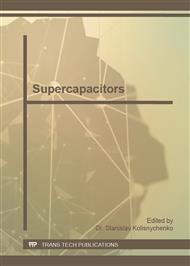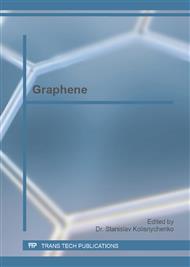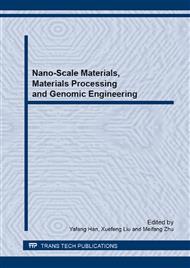[1]
A. S. Aricò, P. Bruce, B. Scrosati, J. M. Tarascon, W. V. Schalkwijk, Nanostructured materials for advanced energy conversion and storage devices, Nat. Mater., 4 (2005) 366-377.
DOI: 10.1038/nmat1368
Google Scholar
[2]
P. Simon, Y. Gogotsi, Materials for electrochemical capacitors, Nat. Mater., 7 (2008) 845-854.
Google Scholar
[3]
Y. Wang, Z. Q. Shi, Y. Huang, Y. F. Ma, C. Y. Wang, M. M. Chen, Y. S. Chen, Supercapacitor devices based on graphene materials, J. Phys. Chem. C, 113 (2009) 13103-13107.
DOI: 10.1021/jp902214f
Google Scholar
[4]
J. R. Miller, R. A. Outlaw, B. C. Holloway, Graphene Double-Layer Capacitor with ac Line-Filtering Performance, Science, 329 (2010) 1637-1639.
DOI: 10.1126/science.1194372
Google Scholar
[5]
M. J Allen, V. C. Tung, R. B, Kaner, Honeycomb carbon: a review of graphene, Chem. Rev. 110 (2010) 132-145.
DOI: 10.1021/cr900070d
Google Scholar
[6]
M. D. Stoller, S. Park, Y. Zhu, J. An, R. S. Ruoff, Graphene-based ultracapacitors, Nano Lett., 8 (2008) 3498-3502.
DOI: 10.1021/nl802558y
Google Scholar
[7]
H. Guan, L. Z. Fan, H. C. Zhang, X. H. Qu, Polyaniline nanofibers obtained by interfacial polymerization for high-rate supercapacitors, Electrochim. Acta, 56 (2010) 964-968.
DOI: 10.1016/j.electacta.2010.09.078
Google Scholar
[8]
K. S. Ryu, K. M. Kim, N. G. Park, Y. J. Park, S. H. Chang, Symmetric redox supercapacitor with conducting polyaniline electrodes, J. Power Sources, 103 (2002) 305-309.
DOI: 10.1016/s0378-7753(01)00862-x
Google Scholar
[9]
D. Li, J. X. Huang, R. B. Kaner, Polyaniline nanofibers: a unique polymer nanostructure for versatile applications, Acc. Chem. Res., 42 (2009) 135-145.
DOI: 10.1021/ar800080n
Google Scholar
[10]
E. Frackowiak, V. Khomenko, K. Jurewicz, K. Lota, F. Béguin, Supercapacitors based on conducting polymers/nanotubes composites, J. Power Sources, 153 (2006) 413-418.
DOI: 10.1016/j.jpowsour.2005.05.030
Google Scholar
[11]
Z. Fan, J. Yan, L. Zhi, Q. Zhang, T. Wei, J. Feng, M. Zhang, W. Qian, F. A Wei, Three-dimensional carbon nanotube/graphene sandwich and its application as electrode in supercapacitors, Adv. Mater. 22 (2010) 3723-3728.
DOI: 10.1002/adma.201001029
Google Scholar
[12]
Z. J. Fan, J. Yan, T. Wei, W. Z.Qian, M. L. Zhang, F. Wei, Fast and reversible surface redox reaction of graphene-MnO2 composites as supercapacitor electrodes, Carbon, 48 (2010) 3825-3833.
DOI: 10.1016/j.carbon.2010.06.047
Google Scholar
[13]
L. Mao,; K. Zhang,; H. S. O. Chan, J. S. Wu, Nanostructured MnO2/graphene composites for supercapacitor electrodes: the effect of morphology, crystallinity and composition, J. Mater. Chem. 22 (2012) 1845-1851.
DOI: 10.1039/c1jm14503g
Google Scholar
[14]
J. Liu, J. An, Y. Ma, M. Li, R. Ma, Synthesis of a graphene-polypyrrole nanotube composite and its application in supercapacitor electrode, J. Electrochem. Soc. 159 (2012) A828-A833.
DOI: 10.1149/2.093206jes
Google Scholar
[15]
J. J. Xu, K. Wang, S. Z. Zu, B. H. Han, Z. X. Wei, Hierarchical nanocomposites of polyaniline nanowire arrays on graphene oxide sheets with synergistic effect for energy storage, ACS Nano, 4 (2010) 5019-5026.
DOI: 10.1021/nn1006539
Google Scholar
[16]
B. Ma, X. Zhou, H. Bao, X. W. Li, G. C. Wang, Hierarchical composites of sulfonated graphene-supported vertically aligned polyaniline nanorods for high-performance supercapacitors, Journal of Power Sources, 215 (2012) 36-42.
DOI: 10.1016/j.jpowsour.2012.04.083
Google Scholar
[17]
M. Xue, F. Li, J. Zhu, H. Song, M. Zhang, T. Cao, Structure-based enhanced capacitance: in situ growth of highly ordered polyaniline nanorods on reduced graphene oxide patterns, Adv. Funct. Mater., 22 (2012) 1284-1290.
DOI: 10.1002/adfm.201101989
Google Scholar
[18]
W. S. Hummers, R. E. Offeman, Preparation of graphitic oxide, J. Am. Chem. Soc., 80 (1958) 1339.
DOI: 10.1021/ja01539a017
Google Scholar
[19]
Y. Xu, H. Bai, G. Lu, C. Li, G. Shi, Flexible graphene films via the filtration of water-soluble noncovalent functionalized graphene sheets, J. Am. Chem. Soc., 130 (2008) 5856-5857.
DOI: 10.1021/ja800745y
Google Scholar
[20]
G. I. Titelman, V. Gelman, S. Bron, R. L. Khalfin, Y. Cohen, H. Bianco-Peled, Characteristics and microstructure of aqueous colloidal dispersions of graphite oxide, Carbon, 43 (2005) 641-649.
DOI: 10.1016/j.carbon.2004.10.035
Google Scholar
[21]
HL. Spell, Determination of piperazine rings in ethyleneamines, poly(ethyleneamine) and polyethyleneimine by infrared spectroscopy, Anal Chem., 41 (1969) 902-905.
DOI: 10.1021/ac60276a032
Google Scholar
[22]
J. Ruokolainen, H. Eerikainen, M. Torkkeli, R. Serimaa, M. Jussila, O. Ikkala, Comb-shaped supramolecules of emeraldine base form of polyaniline due to coordination with zinc dodecyl benzenesulfonate and their plasticized self-organized structures, Macromolecules, 33 (2000) 9272-9276.
DOI: 10.1021/ma000010k
Google Scholar
[23]
Y. Xia, J. M. Wiesinger, A. G. MacDiarmid, A. J. Epstein, Camphorsulfonic acid fully doped polyaniline emeraldine salt: conformations in different solvents studied by an ultraviolet/visible/near-Infrared spectroscopic method, Chem Mater, 7 (1995) 443-445.
DOI: 10.1021/cm00051a002
Google Scholar
[24]
Y. H. Lee, C. Z. Chang, S. L. Yau, L. J. Fan, Y. W. Yang, Conformations of polyaniline molecules adsorbed on Au(111) probed by in situ STM and ex Situ XPS and NEXAFS, J. Am. Chem. Soc., 131 (2009) 6468-6474.
DOI: 10.1021/ja809263y
Google Scholar
[25]
D. W. Wang, F. Li, J. Zhao, W. Ren, Z. G. Chen, J. Tan, Z. S.Wu, I. Gentle, G. Q. Lu, H. M. Cheng, Fabrication of graphene/polyaniline composite paper via In situ anodic Electropolymerization for high-performance flexible electrode, ACS Nano, 3 (2009) 1745-1752.
DOI: 10.1021/nn900297m
Google Scholar
[26]
T. Morishita, Y. Soneda, H. Hatori, M. Inagaki, Carbon-coated tungsten and molybdenum carbides for electrode of electrochemical capacitor, Electrochim Acta, 52 (2007) 2478-2484.
DOI: 10.1016/j.electacta.2006.08.056
Google Scholar
[27]
W. Sun, X. Y. Chen, Fabrication and tests of a novel three dimensional micro supercapacitor, Microelectron. Eng., 86 (2009) 1307-1310.
DOI: 10.1016/j.mee.2008.12.010
Google Scholar




